Metropolitan Hilarion of Volokolamsk celebrated the Divine Liturgy in the church of the Chernigov Metochion on his Nameday
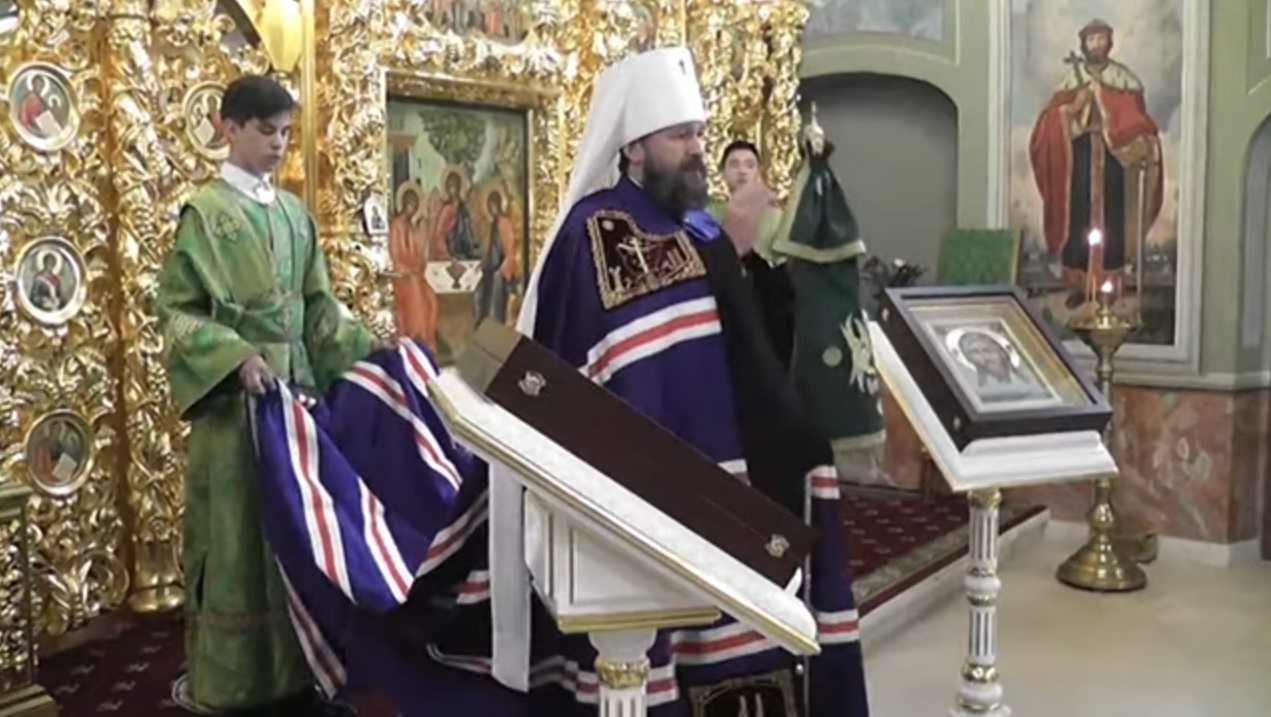
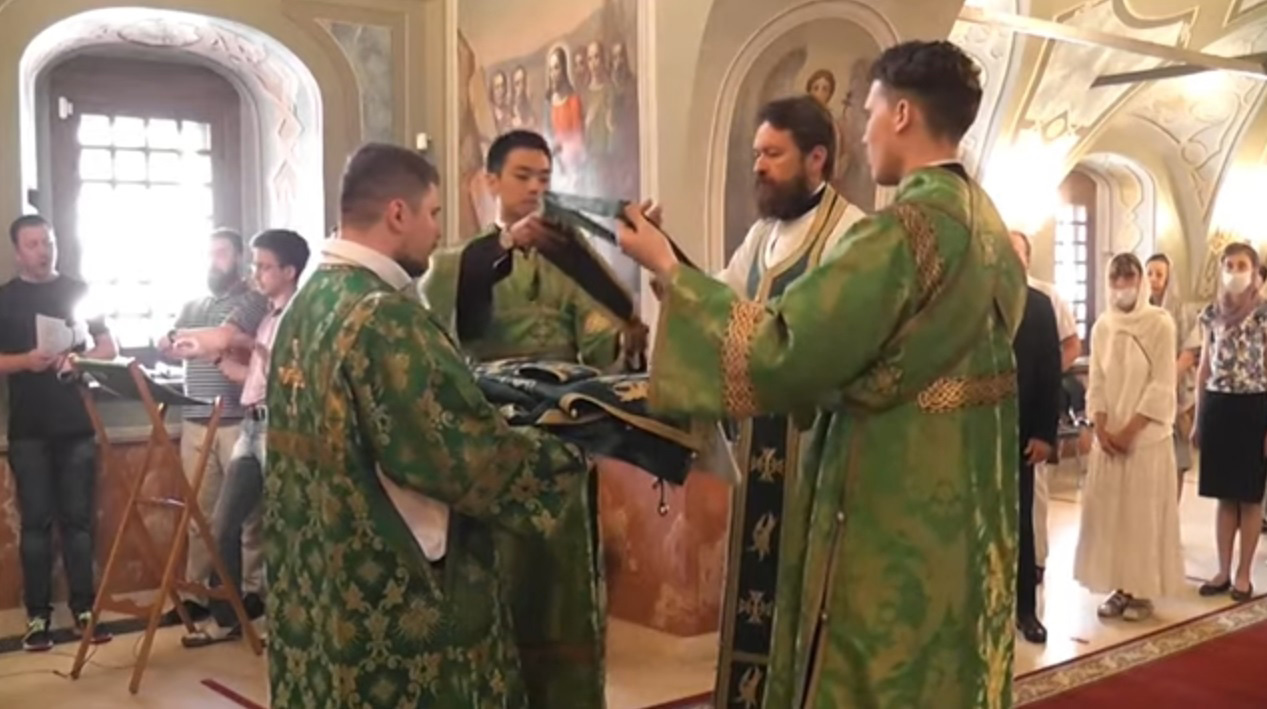
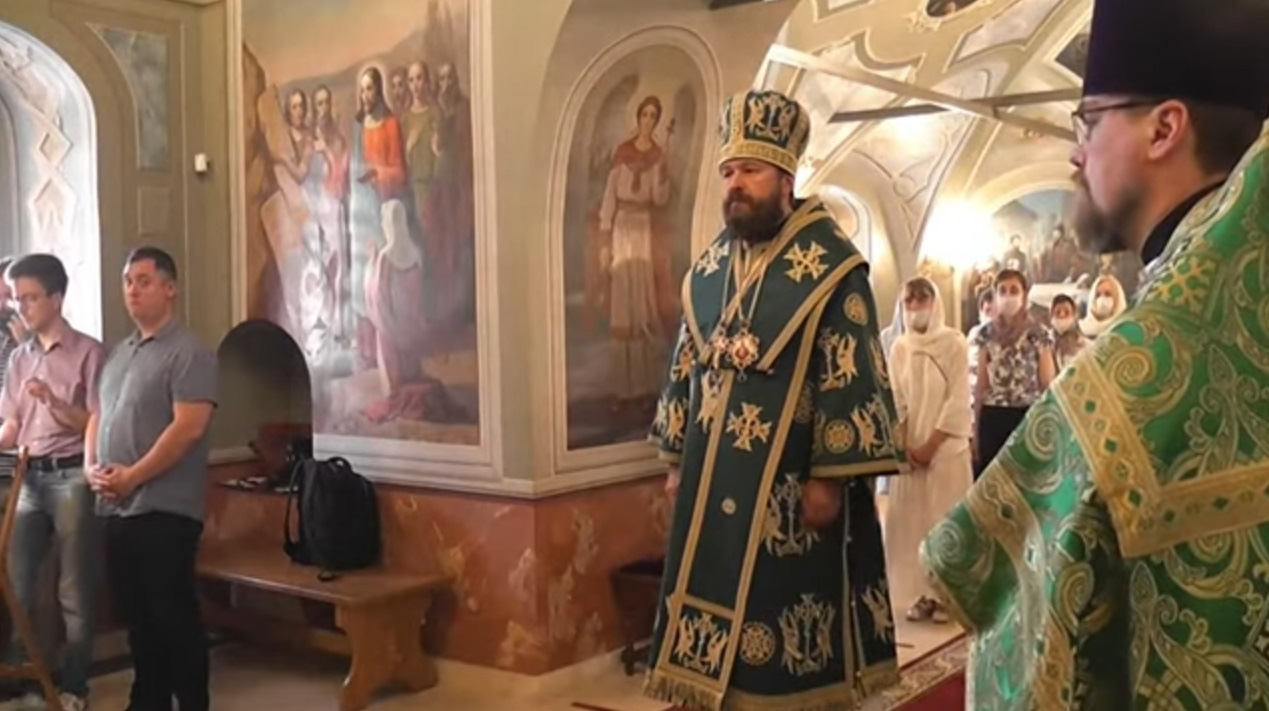
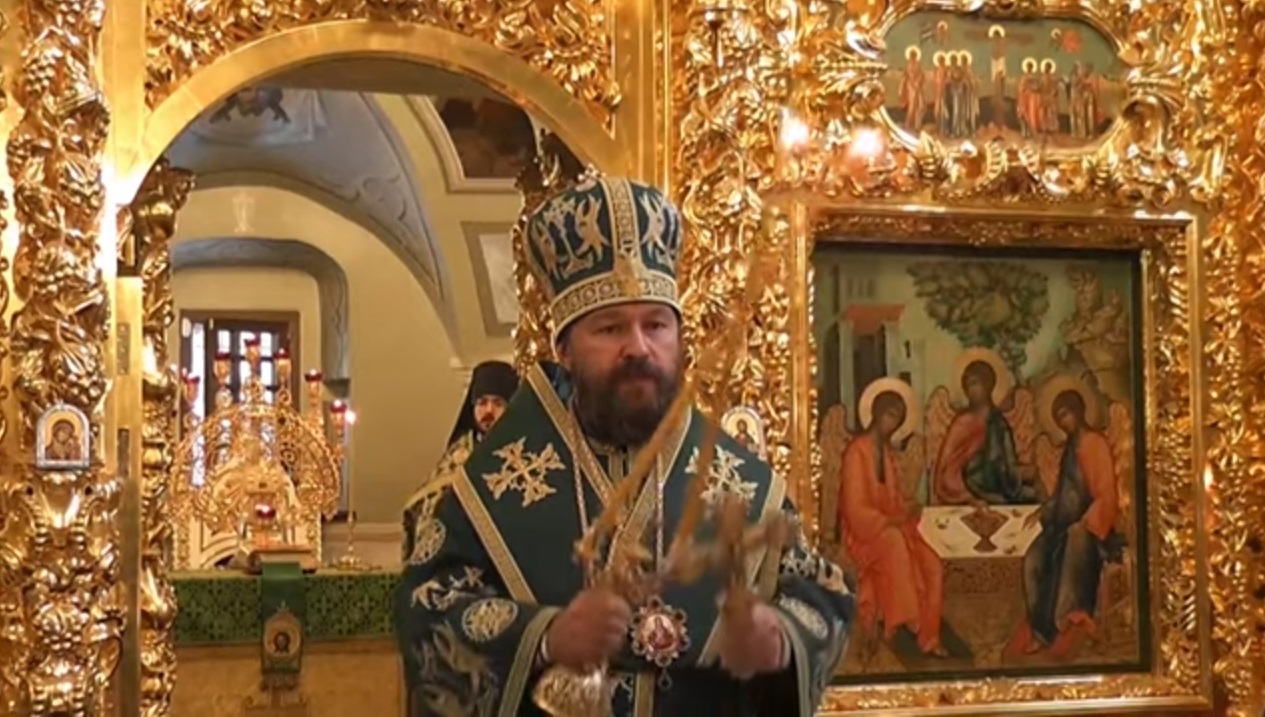
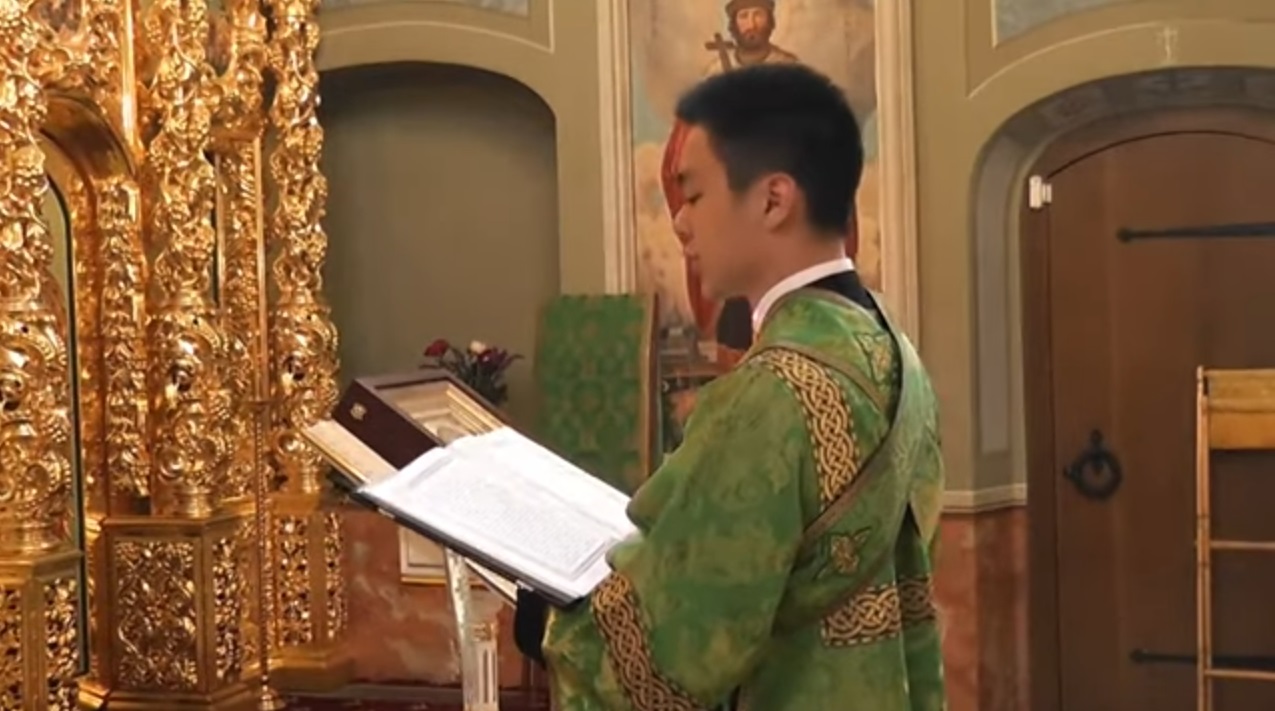
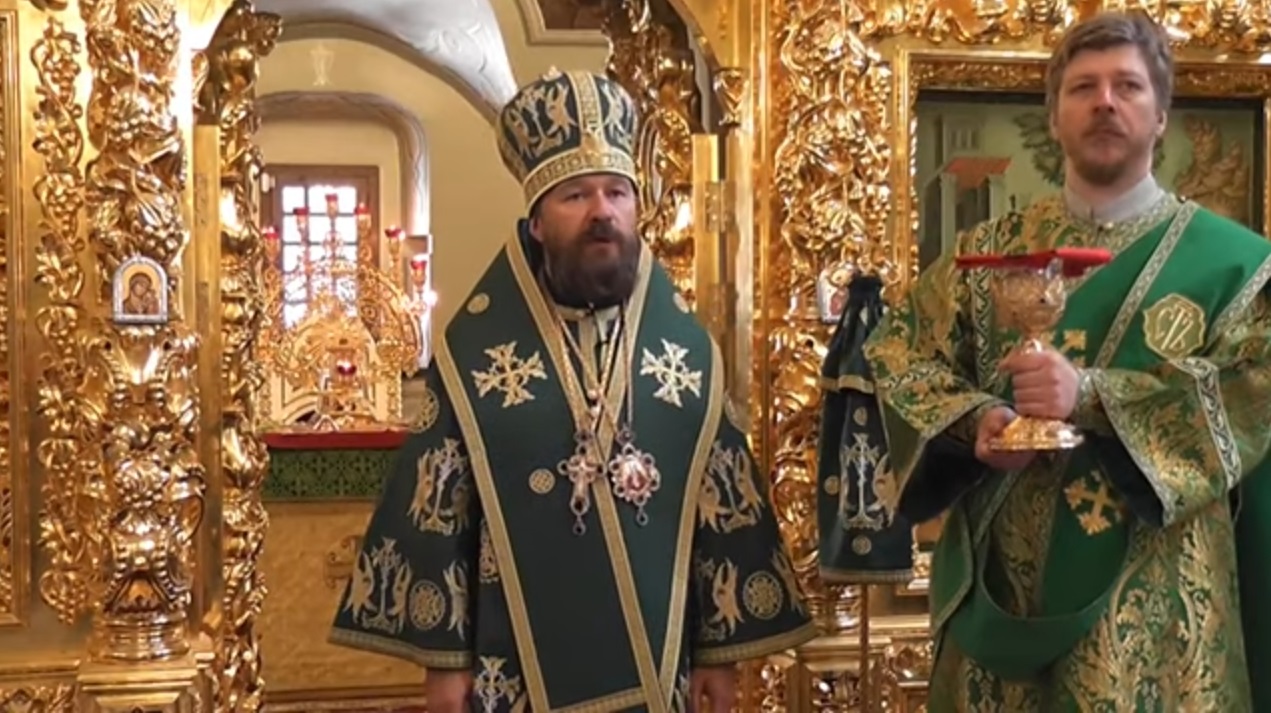
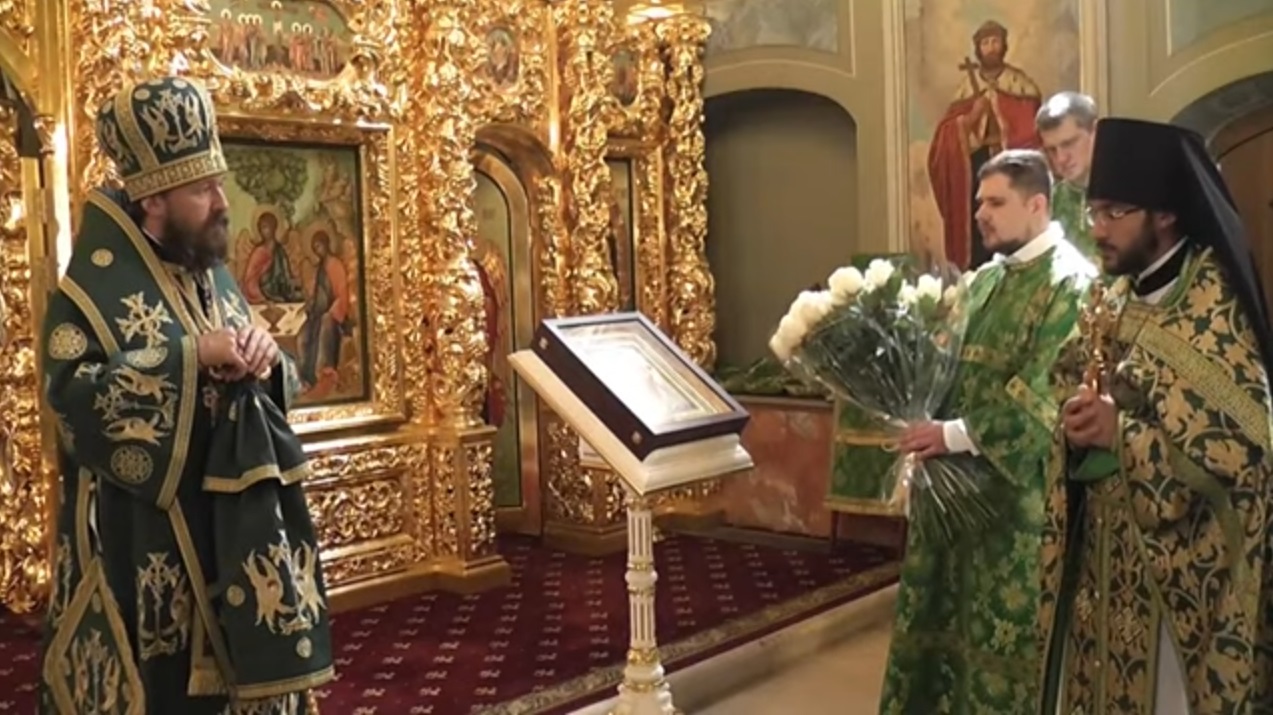
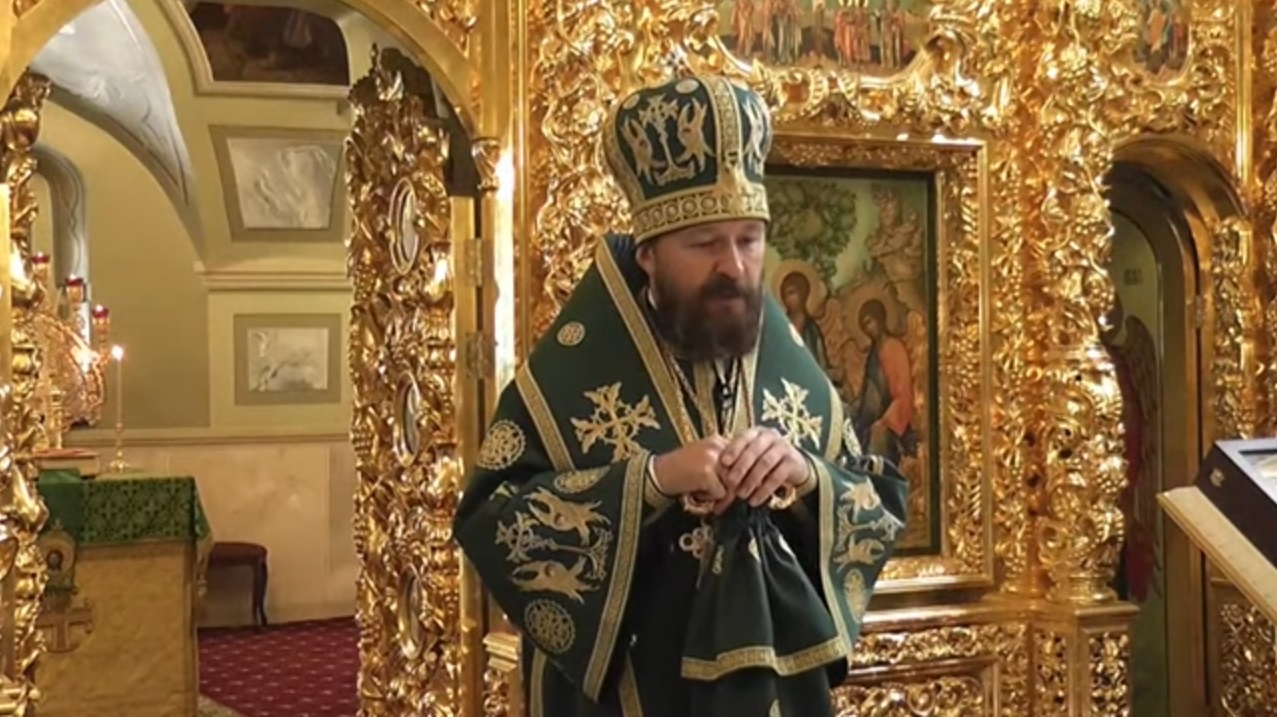
On June 19, 2021, the commemoration day of his heavenly patron – St. Hilarion the New and the 34th anniversary of his monastic vows, Metropolitan Hilarion of Volokolamsk, DECR chairman and rector of the Ss Cyril and Methodius Institute of Post-Graduate Studies (CMI), celebrated Divine Liturgy in the church of Holy Martyrs Michael and Theodore the Brothers of Chernigov of the Chernigov Patriarchal Representation in Moscow, in whose compound the CMI is accommodated with the blessing of His Holiness Patriarch Kirill.
Vladyka Hilarion was concelebrated by his assistant – hieromonk Ioann (Kopeykin) and other clergymen of the Metochion.
During the Litany of Fervent Supplication, petitions were offered up for deliverance of the coronavirus infection. After the Litany, Metropolitan Hilarion lifted up a prayer recited at the time of the spread of baneful pestilence.
At the end of the service, Hieromonk Ioann (Kopeykin) addressed the rector of the CMI with the words of greetings, noting, in particular:
“Today, on the day of your heavenly namesake, you celebrated the Holy Eucharist in the Church of saint Michael and Theodore of Chernigov. Perhaps it is no coincidence that today's Gospel is dedicated to the words of Christ about the bread of life - the Holy Eucharist. You always teach, this is the cornerstone of your sermon, that the Liturgy, the communion of the Holy Mysteries of Christ is the foundation of all Christianity, the basis of our way of life and of all our common being.
Vladyka, today, as your faithful children, we want to assure you that we share your love for the Liturgy, for the Eucharist. We share that love that you instill in your priests, deacons, subdeacons, laity, and all of us. In these difficult days we pray with you, and we are glad that today we partake of the same Eucharistic Cup and prayer. "
In his sermon to those present in the church, Metropolitan Hilarion of Volokolamsk said:
“Dear fathers, dear brothers and sisters!
I sincerely thank you for the congratulations on the name day, which coincided with Trinity parental Saturday. Today we offered prayers not only for the repose of our loved ones and relatives, but also for all the departed.
On this day, I always remember the monastic tonsure, in which I received the name of the Monk Hilarion the New, Abbot of Dalmatia. This name was given to me in honor of the saint who lived in the era of iconoclasm. With his labors and devotional deeds he contributed to the victory of the practice of the veneration of icons.
Of course, when 34 years ago I took monastic vows, I could not imagine what would await me on the monastic path. Over the years, I was a monk in a monastery, a priest at a remote village, and a rector of a large city parish. I studied theology both at Russian and foreign institutes. And now, for almost twenty years I have been carrying out the bishop's service.
Sometimes they ask: to what extent is the hierarchal service combined with monastic vows? After all, a monk is called to a humble life, to solitude, to prayer, to fulfill the many hours of prayer rule, to daily worship, and the bishop is always in public, in plain sight, he may not have enough time for many hours of monastic rules.
But it only seems that the episcopal service does not fit well with the monastic way of life. In fact, these two ministries fit together very well. A bishop is, first of all, a person who must devote his whole life without reserve to God and the Church. That is why, since ancient times, bishops in the Orthodox Church have been unmarried people who do not have a family. They should not have any other care, any other interests, except for what is entrusted to them by the Church. A bishop is a person who cares about the Church inheritance entrusted to him.
In the Russian Orthodox Church there are vicar bishops who help the ruling ones. There are ruling bishops who govern territorial units - dioceses. There are bishops who head the synodal institutions, that is, they are responsible for a whole direction in the activities of the Church. There are bishops who lead theological educational institutions.
In my monastic and episcopal age I have happened to be both the one and the other, and the third, and the fourth. I have helped the diocesan bishop, and was the diocesan bishop myself; for more than twelve years I have been the head of all external Church activities of the Russian Orthodox Church and have run a higher educational institution of the Moscow Patriarchate.
I think that all these positions are quite compatible with each other, and, most importantly, with the monastic way of life, because it is the monastic way of life that makes it possible to focus on each of the services and obediences in such a way as to fulfill it as responsibly as possible.
When I was appointed abbot of these two churches, we came and saw here what the Holy Scriptures call “an abomination of desolation standing in a holy place”. In Soviet times, many churches were rebuilt beyond recognition, not to mention the fact that many were simply wiped off the face of the earth. Our two churches have survived, they even had domes, and there were crosses on the domes. But both churches had to be restored - both outside and inside. The city authorities and many benefactors helped us. The churches have regained not only their former splendor, but, perhaps, began to look even better than ever. We painted these churches, arranged iconostases, and most importantly, established liturgical life here, because for the bishop, for the clergy under his jurisdiction, and for the laity who come to churches, the most important thing is the service of the Holy Eucharist. It is around the Holy Eucharist that the life of every parish, every theological school and every church institution is built. This is the most important work that we do together: both the bishop who serves, and the priests and deacons who will concelebrate him, and the laity who participate in the Eucharist through the communion of the Holy Mysteries of Christ - we are all ministers and co-ministers at the throne of God.
Over the years, we have managed to do one more very important thing: to ensure that theology becomes a recognized academic discipline in the Russian state. In Soviet times, no theology existed, because religion was perceived as a sum of prejudices. But when the situation changed, a question arose in the scientific community, or, more precisely, we raised this question – why is theology not taught at our higher educational institutions. Before theology had been recognized in the scientific community, we had to overcome a great number of various obstacles.
We were told: “What kind of science is this? This is pseudoscience. " And we, in turn, reminded that many universities in the West originated from schools of theology. This was the very first science that was studied, whereas other sciences began to be built around it. We repeated this at different meetings, in different commissions. I met with the ministers of education and science: in twelve years there had been five of them. And under every minister we took some step to recognize theology as a science. But, of course, we would not have achieved success in this and would not have achieved the recognition of theology as a science, had it not been for our President, who gave instructions to the relevant state bodies to pay full attention to the request not only of the Russian Orthodox Church, but also other traditional religious denominations.
In order to fulfill the Church obediences that are entrusted to us by the hierarchy, we, first of all, are called to be responsible and feel our responsibility for each of these obediences. We must not think that one obedience is more important than another. One church is larger, the other is smaller. One is more visited, the other is less visited. One is more beautiful than the other, or that one obedience is more responsible than another. We should treat our obediences as monks, that is, we must accept them as the will of God.
I would like to wish all of us to always treat everything as if it is entrusted to us by God. Let us with all responsibility bear the ministry entrusted to us, and ask the Lord to give us the strength and health necessary for this.
First of all, I wish you all good health. Take care of yourself and your loved ones. Wear masks, keep your social distance. Those who have not been vaccinated, be sure to get the vaccine, because, as you can see, the epidemic continues, the number of people infected has increased again, and all this happens for one reason: few people have been vaccinated against the coronavirus infection. When enough people are vaccinated, then the pandemic will end. There is nothing supernatural about it, nothing specifically religious. This was the case with all epidemics. And if the authorities - civil and sanitary - urge us to fulfill certain requirements, let us fulfill them so that this attack ends, thanks to our common efforts.
I congratulate all of you on the holiday - on the upcoming Day of Holy Pentecost! May the Lord keep us all for many and good years! Amen.
DECR Communication service